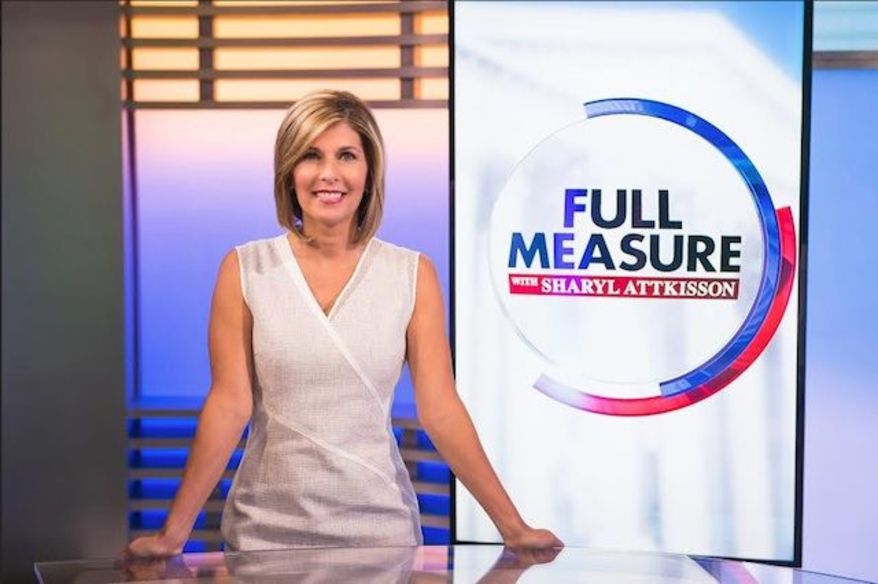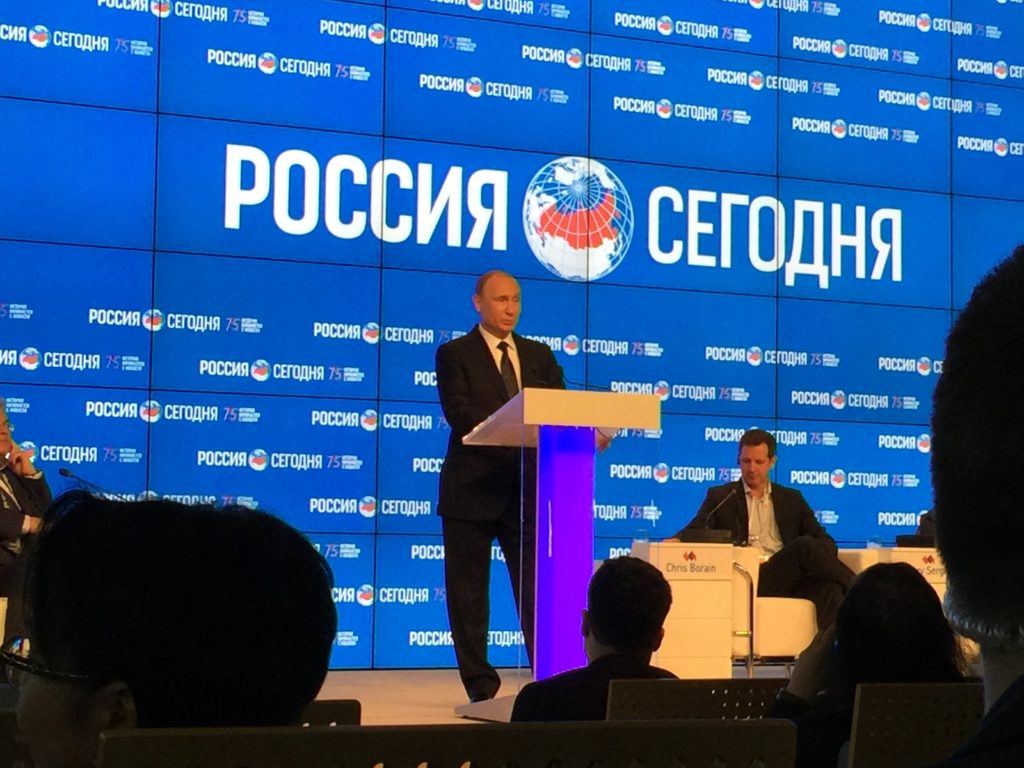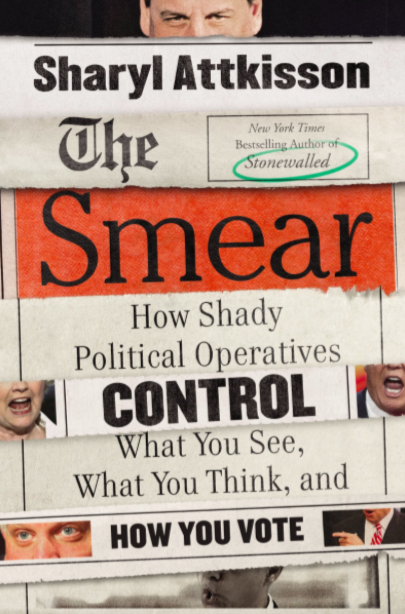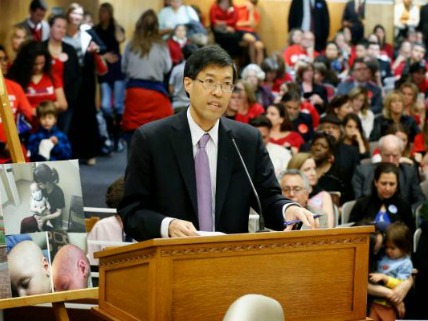ORIGINAL LINK

WASHINGTON – If you want to spot a forged painting, ask an art expert.
And if you want to find out what is “fake news,” ask perhaps the top investigative reporter in journalism.
Sharyl Attkisson spotted the fake news trend long before it became a recent catchphrase.
And she doesn’t portray it, as do many in the mainstream media, as some right-wing conspiracy. In fact, Attkisson told WND she often sees the mainstream media as prime culprits when they push suspect stories.
So, what is really behind the mainstream media’s war on fake news?

Sharyl Attkisson
“I think the anti-fake news movement itself is a campaign for a narrative-driven propaganda campaign that started about September,” reflected Attkisson.
And what’s the purpose of the anti-fake news movement?
“I think there’s an agenda to censor the news as opposed to actually trying to eliminate fake news,” she said.
Attkisson won five Emmy Awards and received an Edward R. Murrow Award for investigative reporting during her stint as the top correspondent for CBS News from 1993 to 2014. Before joining CBS, Attkisson was an anchor and correspondent for CNN from 1990 to 1993.
She is now the anchor of her own Sunday morning national TV news program, “Full Measure,” which focuses on investigative and accountability reporting. The show had it highest ratings ever, last week.
Years ago, Attkisson noticed the emergence of what is now called fake news, only she called such stories by their traditional name: a smear. The reporter began researching the topic in earnest, and the result is her new book, coming out on May 22, titled, “The Smear: How Shady Political Operatives Control What You See, What You Think, and How You Vote,” due to be published on May 22, 2017.

WND has quoted Attkisson, widely hailed as an unbiased, scrupulous and dogged investigator, on numerous issues. Her observations on fake news were delivered with the force and precision of an expert karate chop, as befitting her rank of fourth-degree black belt in Tae Kwon Do.
And she was both surgical and blunt in describing the genesis of a fake news story that was widely used against Trump in the 2016 presidential campaign.
“The white nationalist narrative was invented on a certain day and time by certain interests,” asserted Attkisson. “You didn’t hear that narrative initially, very much. There are various narratives you can measure that happened throughout the campaign, and in the book I discuss during what time periods they arose.”
“Roughly,” she continued, “at first it was that Trump was a clown, a carnival act, they were trying to sort of make him out to be silly and not serious. Then, as soon as he became serious, or realized that didn’t work on him, he became dark and dangerous. It completely went from ‘He’s a clown-like figure’ to ‘He’s a dangerous figure.'”
The super-sleuth reporter then described, in detail, how this was a prototypical case of how a left-wing advocacy group could turn its agenda and narrative into “facts” in the mainstream news.
“The white nationalist stuff came up through a pro-Hillary Clinton group run by David Brock (founder of the liberal group Media Matters) called Blue Nation Review. And they wrote like six articles in five days that were all about alt-right, white nationalists, racists, stuff like that.”
Following the interview, Attkisson sent WND the titles of those Blue Nation Review pieces, which, she said, “I think show they were pushing out a specific narrative. Prior to this time, there was very little if it. They were on different themes.”
She described how, on Aug. 15, “The collective David Brock propaganda groups begin a theme and meme of Trump and his supporters as ‘white nationalists.'”
“And,” she relayed, “Brock’s Blue Nation Review pummeled Trump in six days with smear articles titled”:
“I think that (those articles) directed the media coverage,” Attkisson observed. “That sends the message out. Everybody went out with their messaging on the liberal side. The media pick that up because that’s who they listen to; that’s the source that they consult.”
“And suddenly,” she remarked, “that became a running narrative because someone made it so, not because anything particular happened. It was more that someone decided that would be the agenda, and that had some effectiveness.”
Attkisson said her new book details “how shady political operatives control what you see, what you think and how you vote.”
She explained, “I’ve just been intrigued in the last few years about the manipulation I see going on, on the news and online, including social media, whether it’s fake Twitter accounts, fake Facebook accounts, propaganda efforts that are started this way and then picked up by what you might consider secondary news outlets, and then are picked up by the mainstream news.”

Media Matters founder David Brock
The ace reporter said it’s “fascinating to watch that process formalize and to dig into its origins,” especially because, “I was subject to some of that when I was at CBS News, the efforts to try to stop certain stories I was reporting that were controversial, because they want to make the subject matter go away.
“I discovered there was a lot of funding and organization behind some of these efforts. In digging into it, I thought other people would find it fascinating, too. I think people have a sense they are being manipulated in what they see and read many times, but they don’t exactly know the extent to which it is happening. That’s what the book will talk about.”
Attkisson said both major political parties are behind efforts to manipulate the news.
“Both Democrats and Republicans want to do this and utilize similar tools to try to influence or manipulate public opinion and advance their narrative.”
But the effort to control the news isn’t limited to political groups.
“There are also corporate organizations, public relations firms, there is a whole cottage industry that’s built up around it in Washington, D.C. Think tanks, nonprofits, PR firms.”
She said they are “bent upon what I call smears, or manipulations. It may be a small fraction of their budgets, but I think it amounts probably to billions of dollars. It’s an export force now. We have smear artists that consult for elections in other countries, and corporate interests in other countries, and so on. It’s just become a huge business.”
Attkisson sees more in the media’s war on so-called fake news than a simple pursuit of the truth.

“I think the anti-fake news movement itself is a campaign for a narrative-driven propaganda campaign that started about Sept. 13, 2016. If you do a little research, you won’t find use of that phrase, not really widely used anywhere prior to that, but it was a narrative that was developed for a specific purpose, I believe, based upon my research.”
She detailed how it is the phrase that is new, not the phenomenon.
“It’s not that fake news doesn’t exist or hasn’t always existed, and, of course, it depends on how you define it. I don’t think anyone corners the market on being able to have the definitive definition. It’s just a phrase we’re using.
“But I think it can mean mainstream news that forwards agendas that are not true; mainstream news that forwards agendas that are true but are highly incendiary, over-exaggerated in terms of their importance for agenda-driven reasons; it can be fake news entirely from anonymous sources online, whether they be blogs or social media or whatnot.”
Attkisson said she thinks there’s a whole range of things that can be fake news, as well as some news that’s called fake, but is not.
“Unfortunately, it’s being applied right now to mean, ‘News I don’t like.’ By whichever side you’re discussing it with. And the danger of the anti-fake news movement is the people who are forwarding the movement, I think, want to be the self-appointed censors who decide what is fake and what is not.

“And that’s where it gets dangerous, because it’s hard for third parties to determine the truth of any case. And when you put that in somebody else’s hands, you are basically giving them the opportunity to cut out news and narrative they don’t like, rather than news that’s truly false or fake.”
Does she think there’s an agenda to censor the news, as opposed to actually trying to eliminate fake news and just disseminate the truth?
“Right. I’m not saying that’s everybody’s motivation, but I certainly think that’s the primary motivation behind it by some of the forces who are involved in it.”
Would she say the mainstream media are victims or propagators of fake news themselves?
“I think they are at times both. I think the media have invented and promulgated fake stories or false narratives, sometimes on purpose, sometimes by accident through not knowing better or being lazy,” Attkisson mused.
“But, I also think, and I wrote about this in my first book [“Stonewalled“] and there will be more discussion in the next one, there’s been some blending between journalists and the forces that want to shape them, corporate and political forces, and that they’ve become kind of one in the same, because they’re invited into our newsrooms, the very people who want to shape opinion and advance narratives in the news.”

“Now we are that. We have become that, to some extent. I do think it’s all blended together, and that’s why we have the problem.”
Would she say the assertion that Russia influenced the election falls under the category of fake news, in some of these respects?
“The sense in which the Russia narrative falls under the fake news category is the idea that it was heavily promulgated at a certain point in time by political interests in a way that I think exaggerated the evidence and the intelligence that existed,” Attkisson explained.
She said she doesn’t know all the facts in the Russia case, but the way the narrative was forwarded rang a bell when she first heard of it, months ago.
“I’ve come to where I think I can fairly well recognize when a campaign is starting, and I recognized the start of that campaign and wondered what was behind it at the time.
“I like to make conclusions based on information from firsthand and trusted sources. And people I trust don’t think there’s strong evidence that we would be able to know right now that Russia somehow influenced our elections. And, to connect any operations directly to Putin is something people I trust say we probably wouldn’t be able to know now.”
That wasn’t the only aspect of the Russian hacking story that seemed fishy to her.
“Some of the press are giving the mis-impression that, if you ask people on the street, they think Russia literally hacked into our elections. That’s the phrase that’s being used, that they somehow changed our votes, or got into our voting machines.
“And, in fact, nobody suspects that. That’s not even on the table. No official suspects that. But that’s the impression, or mis-impression, being forwarded and advanced. So I think that’s sort of fake news.”
WND asked if fake news can be the result of laziness or sloppiness as well as agenda-driven politics. What does she think about the role of journalists?
“All of those things can be true. Let’s take the fuss over President-elect Trump’s phone call from Taiwan. And there was immediately, on most of the news, what I would say was condemnation, scorn, ridicule and so on.
“Now, I’m not an expert on of these topics, China and Taiwan, and so I don’t immediately know what conclusions to draw, but a bunch of journalists immediately drew a conclusion. And what I like to say is, most journalists are like me, they’re not experts in a subject matter area like China and Taiwan on a moment’s notice. So how are they forming a conclusion that they are so strongly able to say President-elect Trump was wrong and made a huge mistake?”

White House press room
Attkisson said those journalists consult sources they know or trust, just as she does.
“I think the difference is, if someone told me something, I’d measure who I’m hearing it from. I’d ask other people. I don’t form a personal conclusion about it because I don’t know enough yet.”
She said it seems like a lot of journalists were clearly told something about the Taiwan call from somebody, and, because most of them didn’t have original information on the subject matter, they then forwarded it their audience without seeking a different opinion or opposing viewpoint, or figuring out why Trump might’ve had good reason to take the call from Taiwan. Or why some people might have thought it made sense to do so.
“And I don’t know,” Attkisson reflected, “if that’s laziness or if they just agree with what they hear and are very anxious to report something negative, because, in general, the mainstream media made it clear they are against President-elect Trump as a candidate.”
She added, “I think people are taking what’s handed to them, in many cases now, whether it’s corporate press releases or government press releases, and just reporting it and accepting it as fact, if it’s a fact they want to hear.
“I was always told in journalism school that if someone hands you a press release, whether it’s from the government or a corporation, it’s almost never news. It may be a starting point for something to look into, but in itself it’s not a story. That’s what they want you to think. And it’s your job to figure out the truth, and not to be used just report something that someone’s trying to slip on your plate.”

WND mentioned its own newsroom noticed completely false news stories cropping up months ago, stories seemingly written to appeal to conservatives, and designed to look like they were coming from credible sources. But, it turned the stories were coming from a liberal who was hoping conservatives would spread the fake stories …
“And it would discredit the right. Yes,” Attkisson finished WND’s thought.
“That’s something I was just telling my mom the other day. When anything (like that) happens, you have to think one weird conspiratorial step beyond it, and I am not talking about just Democrats or Republicans. But when you see stuff on the news, you just can’t take these narratives at face value. People put them out there.”
She described how she had friends posting stories on Facebook about towns supposedly teeming with Confederate flags and pro-Trump signs, “and people screaming they hate black people and things like that.”
“And that smacks, to me, knowing what I know, of an effort by some liberals, possibly, to make it look like this is what conservatives do, because I did not believe there was a widespread movement of conservatives who were necessarily doing that.”
Attkisson mentioned how there have been several arrests of people who vandalized buildings “with racist, anti-black graffiti, for example, and it turned out to be a black man who did it. And there was a Muslim woman who said she been attacked by pro-Trump supporters and was arrested when it came to light that it didn’t happen.
“So I do think there are movements that set up these counterintelligence operations, and people have to look deeper and not take everything at face value.”
WND said, aside from fake news sites that just make up stuff out of whole cloth, it sounded like Attkisson was saying the mainstream media also have been guilty of what can be called fake news, because they share an agenda with those from whom they get information. Is that fair to say?
“Yeah. Not just because they share an agenda but because what they’re reporting is not in the proper context to accurately reflect the truth of the facts, or is itself completely fake. Yeah, that happens too,” she flatly declared.
“I’ve also heard conservatives say is it fake news when the Detroit Free Press says Clinton won Michigan, and Clinton didn’t win Michigan.
“Is it fake news when every news organization, practically, and every pundit says Trump has no electoral path to victory, which was completely false. It was an opinion that was formed pretty much as a fact by some people. It was harped upon over and over again, almost as if to drum that into the consciousness of people who might otherwise think he had a chance. So things like that, I would put in the category of fake news.

President-elect Donald Trump giving his victory speech (Twitter)
“Now some people try to define it,” she continued, “by saying, ‘No no no, fake news is not a mistake; it’s not when you don’t mean to say something fake; it’s when you’re meaning to say something fake. Well, they are defining that for their own purposes and reasons. But I think there’s all kinds of ways you could define it. If you want to use their propaganda phrase, I think there are many ways you could define it.”
What about plans to install gatekeepers to determine what news is fake and what is not?
“The problem with someone trying to stop fake news, someone like Facebook or Google, is these folks have deep ties to political people.”
Attkisson referred to Google officials meeting 427 times with White House officials, as of last May. Google executives attended 363 meetings with administration officials, including President Obama, his chief of staff and senior policy officials such as senior adviser Valerie Jarrett, Council of Economic Advisers Chairman Jason Furman and National Economic Council Director Gene Sperling. Google’s top lobbyist met with Obama four times and visited the White House 128 times since 2009, more than any top 50 lobbying firm.
More disconcerting, many of those meetings occurred while the Federal Trade Commission, or FTC, was investigating anti-trust allegations against Google.
Emails showed how the White House’s Internet adviser, R. David Edelman, contacted Google lobbyist Johanna Shelton before the FTC’s decision in January 2013. He requested Google’s talking points and wrote to her, “Obviously, lots of interest here at the WH.”

The Wall Street Journal revealed, “FTC staff investigators had recommended a lawsuit against Google for abuse of its monopoly power and anticompetitive practices.” But the FTC instead settled the case.
Additionally, Bloomberg reported, “The meetings came on the heels of President Obama’s successful re-election campaign in which Google’s chairman Eric Schmidt had played an important role. The White House also met repeatedly with top FTC officials during that period.”
Attkisson observed, “These people who consult with political operatives or corporate interests, they are going to be the ones to censor our news? And tell us what truth is? And even when that truth is more a matter of opinion or not even fully known?”
“I’m really nervous about someone saying we’ll decide the truth,” the seasoned reporter flatly stated.
“You know, they used to say cigarettes couldn’t cause lung cancer. So, theoretically, a story or study that said otherwise wouldn’t show up on your Google search today, because that had been determined at the time not to be true.”
“Why would you put fake news on Google?” she deadpanned rhetorically. “So there are things we would never know about if you put these people who claim to know more than everybody else out there [in charge of determining the truth].”
Attkisson also referred to the Facebook scandal in which its news curators admitted the social network had been removing conservative news from the list of trending stories and pushing liberal stories.
“These are the people you want to filter your news for you?”

She continued, “In my personal opinion, corporations have a right to do that, to do their private business and let Facebook develop their own policies. But, I think they should say to you, ‘Do you want us to censor and filter your news for you? Do you want us to decide what is fake?”
“And if you check the box and say yes, then I think they should do that for you. If somebody was put that in someone else’s hands and they trust them and that’s what they want to see, they should have that. But I think you should be able to opt out of that. If you don’t want your news curated.”
But that’s not how she works.
“Me? I look for stuff that other people try to keep me from seeing. I seek that stuff online. Because that’s where I find some stories. And, occasionally, I do find truth in these places where they don’t want you to look. Or where they are trying to marginalize stories and make them controversial.”
“One last little thing,” Attkisson added.
“Part of the directive on how to find out if something is fake news, is a narrative is that if it’s not in the Washington Post or New York Times, or Snopes says it’s a myth, you know not to believe it.
“Well, all those sources, in my view, can be suspect. And Snopes especially has been incorrect, factually incorrect, on a number of topics. So the very places some people have directed us to, to get the truth, are the very places where I think I wouldn’t necessarily look for it.
“And I think that’s a danger.”
via
IFTTT






 It was the perfect ending to the strangest election in modern American history. Donald Trump was officially elected as the next president of these United States on December 19, winning by a wide margin in the Electoral College despite having lost the national popular vote six weeks earlier.
It was the perfect ending to the strangest election in modern American history. Donald Trump was officially elected as the next president of these United States on December 19, winning by a wide margin in the Electoral College despite having lost the national popular vote six weeks earlier.


 Anti-vaccine activists are sounding the alarm about a California bill that should trouble you even if you have nothing against immunization. The bill,
Anti-vaccine activists are sounding the alarm about a California bill that should trouble you even if you have nothing against immunization. The bill,